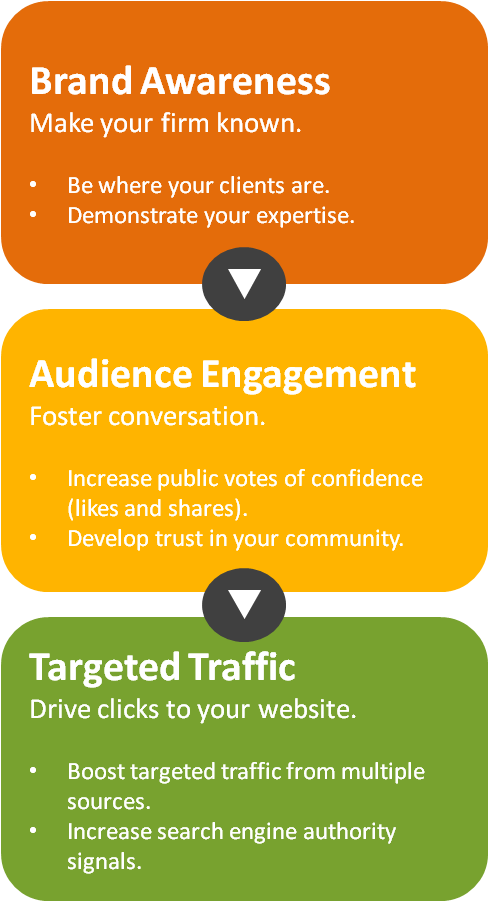A Training Article for FindLaw Clients by Michael Owen Hill, Team Lead of Social Media
Your Blog Services team at FindLaw is dedicated to providing you, our valued client, with in-depth guidance and information regarding your FindLaw blog. In this article, we will discuss the importance of maintaining the proper focus and scope in the content of your blog. You may already have heard – perhaps from multiple sources (your FindLaw client development consultant, your project manager, your account manager) – that your blog should be “focused.” But what exactly does this mean?
Subject Matter Focus
For any “standalone” blog (a blog with its own unique Web address) it is generally best that the content on your blog – the individual posts – be focused within one legal practice area (e.g., criminal defense, family law, personal injury, business law, etc.). There are several reasons for this:
- Subject matter focus enables your blog to be competitive in terms of search visibility.
- Subject matter focus creates an opportunity for the visitor to your blog to learn more about the need or interest that brought them to your blog in the first place.
- Subject matter focus sends a message to the visitor and to the search engines alike that you have substantial knowledge and authority regarding the subject.
You may be wondering, “Won’t that make my blog seem repetitious?” The truth is that some level of repetition of key concepts and ideas (and search engine optimization keywords) is good. It’s good for the search engines – it sends a message that your blog is a reliable and consistent source of information about a particular topic. It’s also good for the visitors to your blog – it sends the message that you have a wealth of knowledge about the topic the visitor is interested in.
In short, subject matter focus can translate into authority with the search engines and with visitors – your potential clients.
Subject Matter Scope
The scope of the content on your blog can be another matter. While the performance of your blog may depend in large part on how focused the subject matter, that does not mean that you cannot include a wide variety or broad scope of information.
For example, let’s take a personal injury blog with a category for car accidents. Within that category, we – the Blog Service Team here at FindLaw – will most likely focus primarily on posting very timely, topical and focused news-based or current events information. That is because it is the best way to generate search visibility and to keep you and your firm “top of mind” with the visitor.
That does not mean, however, that reports of car accidents or recently released statistics or other very timely, current-events-style posts are the only kind of content that can help this blog perform. Practical guidance for accident victims, a description of the legal challenges they face, details about the insurance investigation process, an explanation of the liability standard in your state – these things can also be of great value to the visitor to your blog (and to the search engines). And these are the kinds of topics that you, the attorney, are eminently qualified to blog about.
So while the content on your blog should definitely be topically focused, it may still be fairly broad in scope.
What about geography?
At this point, you almost certainly know how important local search and geographical keywords are to the visibility of web content. If not – or if you need a quick refresher – here’s a simple rule: “Like politics, (almost) all search is local.”
That means that we definitely want to have a set of local keywords (your county, state, metro, etc.) that we use to “localize” the content of practically every post. It means we will want to focus on the localities in which you practice – and in which your target market is searching for help.
This is almost always true, by the way, even if you have a regional or nationwide practice. Things can get a bit complicated in those cases, so if you have questions about your target geography, it would be a good idea to contact your FindLaw account manager. He or she can either answer your question or put you in touch with an expert in our offices who can.
Now, after all I’ve said about how important it is for your blog to be geographically focused, you may be wondering, “Does that mean that every blog post has to be about something that happened in my state, county or city?”
No. That is where scope comes in. We want the content on your blog to be geographically focused – in terms of the keywords we use – but the events we reference and the scope of the content can be regional, national or even international. It all depends on what will strike the best balance between local pertinence and broad-based visibility.
Focus, Scope and Your Blog
In case our discussion of focus and scope has been a little confusing, there is some good news – FindLaw’s writers are highly skilled at balancing the topical and geographical focus and scope of the blogs we support.
You will definitely notice some variation in the focus and scope of the individual blog posts we publish on your behalf. You may also detect a subtle (or not so subtle) difference between the posts in different categories on your blog. This variability is intentional, the goal being to provide your blog with the best foundation in terms of search visibility and user engagement opportunity.
In general, however, you will find that the posts we publish on your behalf will be both topically and geographically focused and somewhat narrow in scope. Again, the purpose being to provide the kind of content we know drives visibility.
As you approach adding your own posts to your blog, we’d like you to consider the following:
- Stay within the practice area. Posts about family law, say, on a personal injury blog will almost certainly confuse not only your readers, but the search engines as well. Sending mixed messages can impact visibility and the experience of visitors to your blog.
- Use local geographical terms. Even when you write about a more general topic or event that is national in scope, try to include some local geographical terms. For examples of how to do this, you might take a look at some of the FindLaw-written posts on your blog that have been broader in geographical scope. You will probably notice that your writer has “localized” the post at some point in the content.
- Above all, think about your audience. In upcoming conversations, we will address the important topic of audience identification and building effective messages to reach – and to serve – your readers and potential clients. For now, suffice it to say that it is one of the most important things you can do as you start from a foundation of, “What kind of information would my potential client want to know?”
A word of advice on the last point – in most areas of practice, the potential client is less concerned with learning about the law than you might think. True, potential clients often want some measure of legal information, but the important thing to remember is WHY the visitors to your blog may want legal information, and HOW MUCH legal information they want.
Based on our research, we know that most potential clients want just enough legal information to be able to ask a question of an attorney without looking foolish.
So it’s more a matter of providing enough information to reassure the potential client than it is providing enough information to convince that client of your expertise. Most potential clients assume you’re an expert. You don’t have to prove it by filling your blog with exhaustively detailed dissertations of the fine points of the law. In our experience, this is not the type of information the typical blog reader will find useful or appealing.
Concluding Thoughts
Hopefully now you know a little bit more about the issues of focus and scope. We will be discussing other features, ideas and practices in future articles.
We are always interested to hear your thoughts and questions. If you have an issue or concern about your BSP subscription, we encourage you to contact your account manager for immediate assistance. If you have more general questions or ideas for future training topics, feel free to submit these using the form on this page.
Thank you for choosing FindLaw for your website, blog and social media solutions.





